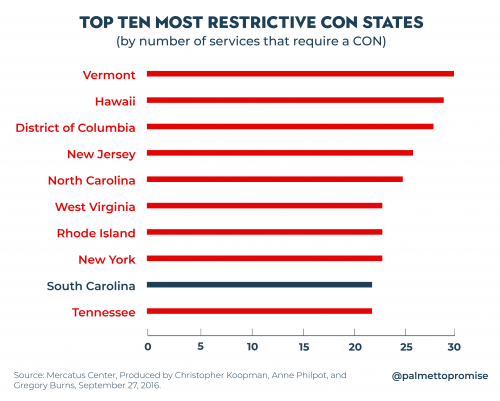Lawmakers and physicians energize effort to repeal South Carolina certificate of need law
A recent report from The Associated Press (AP) highlights reenergized efforts in the Palmetto State to repeal a state law imposing barriers to where medical facilities can be built and how they can be expanded. Rep. Nancy Mace (R-Daniel Island), along with House Ways & Means Chairman Rep. Murrell Smith (R-Sumter), have renewed the effort to finally bring an end to oppressive Certificate of Need, or “CON” laws in South Carolina. Mace’s H.3823, with 30 co-sponsors, takes an aggressive approach, removing CON from the state code entirely.
Since 1971, South Carolina has been among 36 states that have chosen to restrict the supply of healthcare services through Certificate of Need (CON) laws. Originally intended to reduce costs and fund indigent care, there has never been evidence that CON laws were accomplishing those goals.
Nevertheless, South Carolina has doubled down over the years, actually expanding the reach of CON. On average, states with CON programs regulate 14 services, devices, and procedures. South Carolina currently regulates 22 services, devices, and procedures, which is much higher than the national average. In fact, South Carolina ’s CON program is ranked the ninth most restrictive in the United States.

Among the supporters of Rep. Mace’s legislation is the Charleston County Medical Society, which just last week sent a letter signed by 100 state physicians to Gov. Henry McMaster, urging him to support legislation to repeal South Carolina’s CON program. As they noted in their letter, “Our CON law facilitates a cartel of ever-expanding hospital systems which block competitors from ever entering into the market.” This claim is supported by a large body of research, including a position paper crafted jointly by the Federal Trade Commission and Department of Justice. Their report, written in the last year of the Obama administration (2016), describes how CON laws create barriers and suppress more cost-effective options:
By interfering with the market forces that normally determine the supply of facilities and services, CON laws can suppress supply, misallocate resources, and shield incumbent health care providers from competition from new entrants.
The FTC/DOJ recommended a full repeal of South Carolina’s CON laws along the lines of the Mace proposal.
On top of that, the US Department of Health and Human Services came to the same conclusion as the FTC and DOJ. In their own words:
CON proponents have argued that CON laws support policy goals relating to healthcare quality and access. However, CON laws would be an indirect—and likely inefficient— way to achieve these goals. Moreover, the evidence suggests CON laws are ineffective. There is no compelling evidence suggesting that CON laws improve quality or access, inefficiently or otherwise.
Because CON regulations limit competition and suppress more innovative and cost-effective health care opportunities, the potential benefits supporters of CON laws tout, such as increasing indigent care or lowering prices, have yet to be seen. Research from the free market Mercatus Center actually shows the opposite—calculating that per capita healthcare spending in South Carolina is $200 higher than necessary because of CON laws. Spending on physicians is $69 higher.
So, if CON laws are incapable of lowering costs, are they at least successful at encouraging higher provisions of charity care due to their ability to inflate prices? The answer? No. In fact, the most comprehensive empirical study to date on South Carolina’s CON laws found no relationship between CON laws and increased rates of charity care. That study also found that CON programs were associated with a decrease in access to hospitals in rural areas.
Evidence clearly demonstrates that Certificate of Need laws do not achieve their intended economic and charitable outcomes, but rather decrease the supply and availability of healthcare services for everyone, especially the poor and in rural areas. By lifting CON restrictions, South Carolina can encourage new providers to enter state healthcare markets, which will lower costs and increase access.
Thankfully, even in the face of significant opposition from existing providers, Reps. Mace and Smith have chosen to take up the CON issue. We salute their courage and their belief that the free market, not government, should control who provides what healthcare service in South Carolina.





